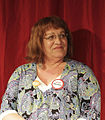Welcome to the Transgender portal Being transgender is distinct from sexual orientation, and transgender people may identify as heterosexual (straight), homosexual (gay or lesbian), bisexual, asexual, or otherwise, or may decline to label their sexual orientation. The opposite of transgender is cisgender, which describes persons whose gender identity matches their assigned sex. Accurate statistics on the number of transgender people vary widely, in part due to different definitions of what constitutes being transgender. Some countries, such as Canada, collect census data on transgender people. Generally, fewer than 1% of the worldwide population are transgender, with figures ranging from <0.1% to 0.6%. Many transgender people experience gender dysphoria, and some seek medical treatments such as hormone replacement therapy, gender-affirming surgery, or psychotherapy. Not all transgender people desire these treatments, and some cannot undergo them for financial or medical reasons. The legal status of transgender people varies by jurisdiction. Many transgender people experience transphobia, or violence or discrimination towards transgender people, in the workplace, in accessing public accommodations, and in healthcare. In many places, they are not legally protected from discrimination. Several cultural events are held to celebrate the awareness of transgender people, including Transgender Day of Remembrance and International Transgender Day of Visibility, and the transgender flag is a common transgender pride symbol. (Full article...) Selected articleThe participation of transgender people in competitive sports, a traditionally sex-segregated institution, is a controversial issue, particularly the inclusion of transgender women and girls in women's sports. Opponents argue that transgender women have an unfair advantage over, and may endanger, cisgender women in competitive sports due to sex differences in human physiology, and that these differences are not sufficiently reversed by transgender hormone therapies. Supporters of transgender athletes argue that medically prescribed puberty blockers and estrogen suppress testosterone levels and reduce the muscle mass of transgender women, reducing possible competitive advantages. Supporters also argue that sport, particularly youth sports, is also about belonging, well-being, and socialization of young people. The American Medical Association states that legislation barring trans women from women's sports harms the mental health of transgender people. The controversy has caused debates regarding sex verification in sports. Since the mid-twentieth century, sports institutions have responded to the participation of transgender women and women suspected to be transgender, male, or intersex by adding eligibility requirements to women's sports variously determined by physical examination, sex chromosomes, and sex hormones. Proponents of such regulations regard them as necessary to ensure fair competition and women's safety. Opponents have criticized such regulations as unfounded, degrading, misogynistic, discriminatory against transgender and intersex women, disproportionately affecting women of color, and violating medical ethics and human rights.[excessive citations] Selected biographySatsuki Nakayama (中山 咲月, Nakayama Satsuki, born September 17, 1998) is a Japanese model and actor, known for his portrayal as Naki in Kamen Rider Zero-One and Shima Nishina in Kiss Him, Not Me. He started his modeling career as an exclusive model for the magazine Pichi Lemon and later became one of the standout models of Japan's genderless fashion subculture. Nakayama initially came out as non-binary in 2019, but he later came out as a transgender man in 2021. Did you know (auto-generated) -
This month's birthdays
More did you know...
Random quoteThey can try to ban us. They can try to get rid of our health care. They can try to deny us housing, credit, and public accommodations. They can try to shame us. They can try all they want to erase us, but at some point, they will realize the trans community is never going away. Trans people are everywhere. Every country, every race, every ethnicity, every religion, every socioeconomic level, every period of human history — we are everywhere. We are natural. You can’t rid of what’s natural. I think they know that, and it terrifies them. Related portalsSelected picturesTopics
CategoriesWikiProjects WikiProjects are non-hierarchical peer-run groups which serve as a resource for the communication on, and collaboration of, content within a specific topic area. Related WikiProjects: Things you can do
Associated WikimediaThe following Wikimedia Foundation sister projects provide more on this subject:
|
-

-

-

-

-
Random portal
Purge server cache
























